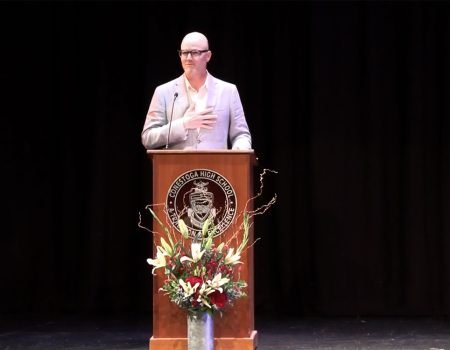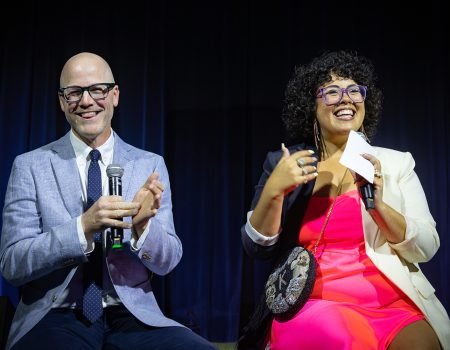Definitely Maybe
I woke this morning around seven. The sky outside my window was foggy and gray. I hit the snooze bar, rolled over, and caught a few more winks.
Milling about my bedroom prior to my shower, I discovered that I was fresh out of clean undershirts. I remembered that thirty-seven pounds of clean darks and whites were waiting for me on Columbus Avenue’s Chesterfield Cleaners. I pulled on some sweats, and made the trek.
80th Street was car-less, and strewn with orange cones. A craft services truck was unpacking boxes of cereal onto a long, wooden table. Yellow signs on light posts indicated that Universal Pictures was shooting the feature film, “Definitely Maybe.” (The film, according to IMDB, stars Ryan Reynolds and Elizabeth Banks, and tells the story of “a political consultant’s attempt to explain his impending divorce and past relationships to his 11-year-old daughter.”)
I picked up my navy blue Ralph Lauren sport coat along with my laundry, grabbed a medium mild from Starbucks (I vehemently resist using Starbucks Speak), and struggled back up five flights. Back in my apartment, I toasted some whole wheat bread, and sat on the couch watching the final fifteen minutes of the documentary, “Enron: The Smartest Guys In The Room.”
It’s an astonishing doc. Even to a guy who is a bit of a news junky (I listen to NPR every morning, I read the Times every day, etc etc) the Enron fiasco was a bit tough to wrap around. I knew Ken Lay and Jeff Skillings’ names. And I knew the company went bankrupt overnight. But the details were vague. The film, then, is a clear, simple, and somewhat witty digest version of the case. In short, the company was practicing creative bookkeeping. Initially, they were treating potential earnings — that is, the money they stood to make — as actual earning. In the end, they were creating markets for abstractions that couldn’t even be quantified, like Internet bandwidth and weather. In the end, they were a company hell bent on making money by any means necessary, including cutting California’s power supply in an effort to inflate prices (remember those rolling black outs?) In the end, the company’s collapse wiped out thousands of jobs, more than $60 billion in market value and more than $2 billion in pension plans. Lay had a heart attack a few weeks prior to his sentencing in January. Skllings is currently serving a twenty-four year prison term.
New Yorker magazine’s cover story this week is about corporate burnout (see “Can’t Get No Satisfaction”. “Burnout,” the article purports, “isn’t necessarily a result of overwork. Ayala Pines, a researcher in Israel who’s looked at burnout in all sorts of inspired contexts (including marriage), rather heartbreakingly sums up the problem as ‘the failure of the existential quest’ that moment when we wake up one morning and realize that what we’re doing has appallingly little value.”
I’ve been thinking about corporations, and values, since Mister Rogers asked me about working for MTV News then said, “I feel so strongly that deep and simple is far more essential than shallow and complex.” (Actually, I was thinking about these sorts of things well prior, like when I announced to my father that I was going to drop out of college and “read a lot of books instead.”) And I thought a lot about burnout last week as I lay in my bed coughing and wheezing and trying to choke down a tablespoon of Tylenol Cold.
These are challenging times for Big Media. Newspapers, magazines and television are dying. Old school executives don’t know what to make of digital. Blogs, user generation, viral video, the landscape is changing all the time. All the while, advertisers are looking to exploit every available tabla rasa. Here at The Network Of Fun, we just launched the most monolithic, old school, slow behemoth ever. Critics hate it, our audience hates it, and most of us hate it. Which doesn’t bode well for ‘the existential quest,’ or for return on investment. This month marks ten years since I joined The Network Of Fun. To feel like a) one’s day job is vacuous (“shallow and complex”) and b) that which was once providing value (my colleagues, our respect of the audience and love of the job) is no longer, well, it’s a tough spot. Mix in a bit of illness, fourth quarter malaise, gray skies, and a general lack of humor and, well…
So I pulled on my dry-cleaned and pressed sport coat, my new boots, and walked downstairs. 80th Street was beginning to bustle. Light grips were standing, pointing, and making plans. The crew was milling around craft services. I crossed Columbus, turned left on Broadway, and descended into 79th Street Station, refilled my Metrocard, and stepped into the station. I walked all the way down the platform (as always), reading an article on Henry Kissinger, while listening to Death Cab For Cutie’s “Brothers On A Hotel Bed” (“Now he lives inside someone he does not recognize / When he catches his reflection on accident ” — appropriate). At the end of the platform, I paused, looked down the tracks, then leaned on support beam. In a flash I realized that beam was covered in fresh paint. I inspected my jacket. The right arm was covered in thick, red, oil-based paint. I mouthed an expletive, looked around to confirm that there were no “Wet Paint” signs, walked out of the station, and straight back to Chesterfield Cleaners.
“MTA paint very good paint,” the woman behind the counter said. “Very difficult to remove. But we will try. And if we cannot, we will make you nice vest.”
She smiled, and handed me a receipt.
“Thanks,” I said. And walked back onto the Hollywood set that is my neighborhood, wondering just what surprises the script held next in store.



